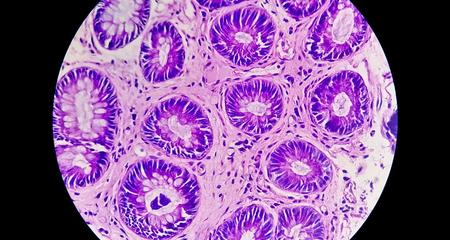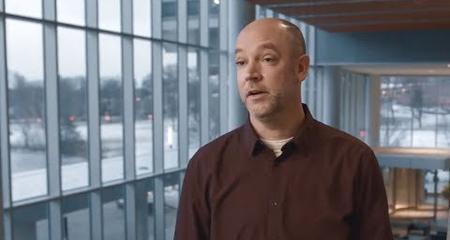Family and medical history can shed important light on a person’s risk for colorectal cancers. Physicians in the Colorectal Cancer Program have special expertise in the understanding and treatment of hereditary colorectal cancer syndromes and they work closely with genetic counselors in treating those cancers.
Genetic Testing for Colorectal Cancer
The Cancer Genetics Screening Program, which is part of the Froedtert & the Medical College of Wisconsin Clinical Cancer Center provides personalized genetic counseling and testing to individuals who may be at increased risk of cancer due to a personal history of cancer, family history or an underlying genetic condition. Genetic counselors provide counseling regarding cancer risk, cancer genetics, genetic testing, early detection, improved cancer management and possible risk reduction.
Specialized genetic testing can give patients better understanding of their risk for developing certain types of cancer. Our genetic counselors educate patients and their families so that they understand what is being tested, possible different outcomes of the test and implications of the results. Once the test results are in, a genetic counselor works with the patient and his or her family and medical team to make a plan for prevention, follow up screenings or other steps. The counselor also works with the colorectal team of physicians to help determine the best plan of care.
Colorectal Cancer Prevention
Preventive steps will be personalized to each patient, depending on the results of genetic testing and that patient’s unique circumstances and other medical considerations. Preventive measures could include more aggressive screenings, lifestyle changes such as quitting smoking, or other medical or surgical steps. If a patient has a hereditary cancer syndrome, he or she may be at increased risk of developing other kinds of cancer as well. All of that must be taken into account when developing a plan of care. Understanding the risks can help patients take better control of their own health.
Patients who may have questions about their cancer risk should learn as much as they can about their family medical history. A detailed medical and family history allows the genetic counselor to better guide each patient in terms of testing and in making the best decisions about preventive and follow-up care.
Hereditary Syndromes
The two most common hereditary syndromes related to colorectal cancer are:
Hereditary Nonpolyposis Colorectal Cancer (HNPCC) Syndrome, also know as Lynch Syndrome
HNPCC or Lynch Syndrome is an inherited condition that causes an increased risk for early onset colorectal cancer (often before age 50.) Patients with HNPCC also have an elevated risk of developing other cancers, including endometrial, ovarian, pancreatic, kidney/urinary tract and others.
Familial Adenomatous Polyposis (FAP) Syndrome
FAP is an inherited condition that is associated with the development of multiple polyps (sometimes more than 100) in the colon and rectum. Polyps can begin to appear as early as the teenage years. If not treated, the polyps are likely to become cancerous by the patient’s mid-30s. In about 25 percent of cases, there may not be a family history of the syndrome.
Research
If a patient does have a hereditary cancer syndrome or a predisposition to cancer, a genetic counselor could assist in finding research studies that would be appropriate. Below are additional links that can provide more information on hereditary cancer syndromes:
- National Cancer Institute
- American Cancer Society
- National Comprehensive Cancer Network
- Colon Cancer Alliance
- Crohn's and Colitis Foundation
Who May Benefit from Cancer Genetic Screening?
You may benefit from a cancer genetic screening if you answer “yes” to any of the questions below. When answering these questions, please consider your mother’s and father’s side of the family.
- Have several of your relatives had cancer, including cancers of the colon, breast, ovary, skin, prostate, thyroid or uterus (endometrium)?
- Have you or a relative developed cancer before the age of 50?
- Have you or a family member had an unusual or rare type of cancer, such as male breast cancer?
- Have you or a relative had more than one type of cancer, such as breast and ovarian cancer or cancer in both breasts?
- Are you concerned about your risk for developing cancer?
- Have you wondered whether you should have genetic testing for cancer genes?
Virtual Visits Are Available
Safe and convenient virtual visits by video let you get the care you need via a mobile device, tablet or computer wherever you are. We’ll gather your medical records for you and get our experts’ input so we can offer treatment options without an in-person visit. To schedule a virtual visit, call 1-866-680-0505.
Recognized as High Performing by U.S. News & World Report
Froedtert Hospital is recognized by U.S. News & World Report as high performing in three adult specialties and 16 procedures and conditions, including cancer, colon cancer surgery and gastroenterology and GI surgery.More to Explore





